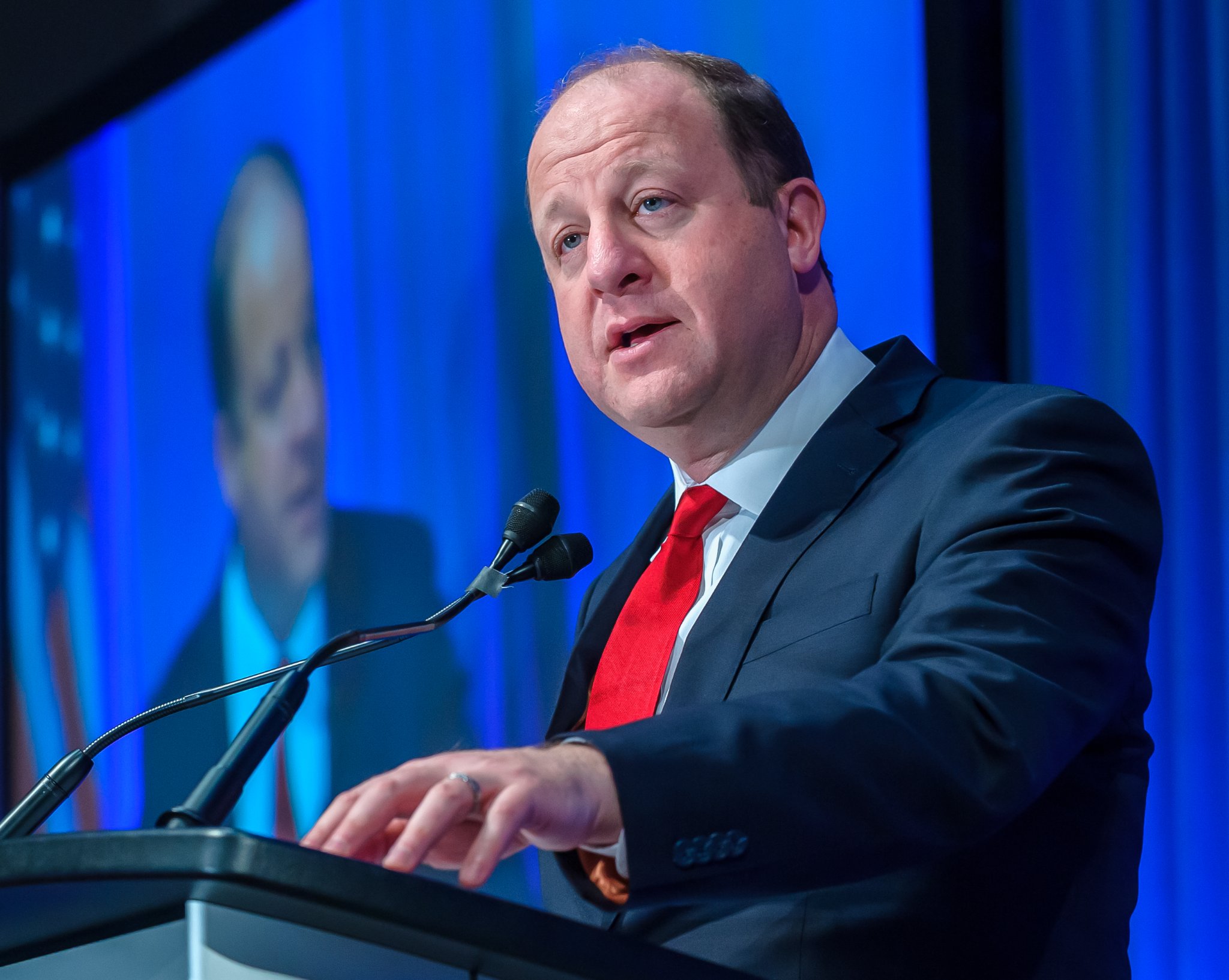
DENVER – May 12, the Colorado business community heard from Gov. Jared Polis and the Denver Metro Chamber of Commerce about the outcomes of the 2022 legislative session at the Chamber’s 2022 State of the State address. The event, presented by Xcel Energy, provided a platform for Gov. Polis, the Chamber and other business leaders to discuss the talent and workforce challenges that Colorado businesses are facing. The event follows the end of the legislative session each year.
Gov. Polis and Denver Metro Chamber president and CEO, J. J. Ament, were joined by Rachel Beck, senior director of government affairs at the Chamber and executive director of the Colorado Competitive Council (C3). A panel to discuss workforce challenges and solutions was held with Michelle Marks, Chancellor at University of Colorado Denver, as the moderator. Panelists included Jake Hirsch-Allen, North America workforce development and higher ed system lead at LinkedIn, Dr. Ian Kristic, regional head and industrial/organizational psychologist at the Myers-Briggs Company, Naeem Ishaq, EVP and CFO for Checkr, Inc., and Meaghan Sullivan, executive director for CareerWise.
“We can be proud as Coloradans of the effort [the legislature] made on workforce issues,” said Gov. Polis to the audience of almost 800 business and community leaders at the Colorado Convention Center’s Four Seasons Ballroom. Gov. Polis cited that Colorado has already recovered more jobs than were lost during the pandemic, and that the state’s workforce participation rate is one of the highest in the nation.
Despite this recovery, a big focus for Gov. Polis was the talent shortage, “We need more talent. And we need to do a better job identifying talent.” He stressed that there is a need in Colorado to provide more alternative pathways for students and to help with upskilling and reskilling current workers.
Gov. Polis discussed Senate Bill 234, which will transfer $600 million in American Rescue Plan Act dollars toward alleviating the $1 billion Unemployment Insurance Trust Fund debt accrued during the pandemic, as a way that Colorado businesses will save money from this legislative session. He also mentioned Senate Bill 238, which will save Colorado property owners $700 million in the 2023-24 tax years. When discussing Senate Bill 238, Gov. Polis stated, “I want to thank J. J. [Ament] and the Chamber for your support on that property tax bill.”
Rachel Beck shared the Chamber and C3’s perspectives on the outcome of the legislative session, stating that their stances support the business community and encourage policy that makes Colorado the best place to live, work and do business. Beck stated, “This session, the Chamber and C3 have shown our strength as collaborative partners by brokering compromises on critical business issues.”
Beck also warned about a lack of stakeholder input in the legislative process, saying, “Veterans of the legislative process will tell you that single party control – no matter which party it is – often results in a lack of stakeholder engagement – and it has this year.” Beck referenced Senate Bill 136, which would have gutted the use of special districts, and House Bill 1152, which would have barred employers from firing employees using marijuana on the job, as legislation that dangerously avoided stakeholder input.
J. J. Ament also commented on the Chamber’s perspective, “Look, the reality is that the business community had an effective legislative session. Unemployment insurance, property tax relief and avoiding or tempering many of the most impactful mandates and regulatory burdens some legislation included. That was the good.”
Ament continued with the difficulties the Chamber and business community faced this session, “In some cases, let’s be honest, we got what we didn’t want—when the legislature degraded the spirit of the Labor Peace Act and overruled local control regarding collective bargaining.” Ament is referencing the passing of Senate Bill 230, which gives counties the right to collectively bargain, a bill that the Chamber has been opposed to since the session began.
The panel discussion reflected much of Gov. Polis and the Chamber’s beliefs for the talent shortage, with panelists stating that providing upskilling and reskilling for workers, and alternative pathways for students to gain workplace skills are the sure ways to strengthen Colorado’s workforce and encourage homegrown talent. There was a focus on fair chance hiring, which is supported by the Chamber through its Prosper Colorado initiative, and on having businesses provide input in training programs for students.
Ament closed with a reminder for the audience, “No matter what side we’re on, please don’t take this for granted: we live and work in a place where we can access our political leaders and express our support for or opposition to any issue in freedom … We should cherish and defend our freedom and democratic capitalism—and the responsible exchange of ideas to make our communities better and stronger—where everyone has a voice.”
To learn more about the Chamber’s stances for the 2022 legislative session, visit denverchamber.org/policy/current-state-legislation
About the Denver Metro Chamber of Commerce
For 155 years, the Denver Metro Chamber of Commerce has been a leading voice for Colorado’s business community. With a membership that spans the state, the Chamber is an effective advocate for small and large businesses. The Chamber’s family of organizations includes the Metro Denver EDC, the Denver Metro Chamber Leadership Foundation, the Denver Metro Small Business Development Center, the Colorado Competitive Council, B:CIVIC, Prosper Colorado and the Denver Opportunity Youth Initiative. For more information, go to denverchamber.org.
